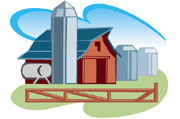Bulletin #2344, Maine Farm Safety Program: Harvesting Crops by Hand Safely

Bulletin #2344, Maine Farm Safety Program: Harvesting Crops by Hand Safely (PDF)
By Dawna L. Cyr, Farm Safety Project Assistant, and Steven B. Johnson, Ph.D., Extension Crops Specialist
For information about UMaine Extension programs and resources, visit extension.umaine.edu.
Find more of our publications and books at extension.umaine.edu/publications/.
Harvesting crops by hand is hard work. It doesn’t have to be dangerous. There are tools, machines, the elements, and other workers to consider. Safe working practices are important.
General Safety Tips
There are some common safety tips that apply to all forms of hand harvesting. Taking care of one’s body is the most important of these. Wear proper clothing. It is best to dress in layers. They can be removed as the temperature rises and put back on as the temperature drops. Wear a hat to protect the head and gloves to protect the hands. Wear shoes or boots that provide adequate foot protection. Wear sunscreen to lessen the chance of skin cancer and insect repellent when needed. Be careful when applying it on the face, because sweat can wash it into the eyes.
- Wear proper clothing for the job.
- Eat well-balanced and nutritious meals.
- Drink plenty of fluids, especially in the heat of the day.
Get plenty of rest. Harvesting any crop by hand is hard work and the body gets tired. Also, drink plenty of fluids, especially water, and eat well-balanced meals. Snacks in-between meals are a good idea to keep energy levels up. Take breaks every few hours to regenerate and stay alert.
Take care of personal hygiene at the end of each day. Remove clothing as soon as you get home. Wash your hands and face with soap before eating. Take a shower and wash your hair every day. Wash work clothing separately from others and wear clean clothes every day.
Harvesting Blueberries
Harvesting blueberries is hard work. The hours are long and raking is very strenuous. Know the signs of heat exhaustion. (See fact sheet Bulletin #2332, Maine Farm Safety Program: Working Around Vehicle Problems Safely.) Use caution when setting the rake down. Make sure it cannot be stepped on or fallen upon.
Harvesting Broccoli
Broccoli pickers work for long hours in all weather conditions. They need to dress accordingly and use the right tools. Knives should be kept sheathed when not in use. Use caution when handling them. When walking with a knife, keep the blade behind the body and away from others. Treat any cuts immediately and seek medical attention if needed.
Harvesting Potatoes
Harvesting potatoes takes a few short weeks in the fall, but much is done during that time. Pickers need to be ready to work when the time comes. Wearing gloves will protect the hands from the rough dirt and cold weather. Pickers need to be aware of what is happening around them in the field. They can be overlooked and possibly run over by vehicles in the field.
This Maine Farm Safety fact sheet is part of an educational fact sheet series produced by University of Maine Cooperative Extension. For more information on farm safety, contact your UMaine Extension County Office.
Information in this publication is provided purely for educational purposes. No responsibility is assumed for any problems associated with the use of products or services mentioned. No endorsement of products or companies is intended, nor is criticism of unnamed products or companies implied.
© 2003, reviewed 2020
Call 800.287.0274 (in Maine), or 207.581.3188, for information on publications and program offerings from University of Maine Cooperative Extension, or visit extension.umaine.edu.
The University of Maine System (the System) is an equal opportunity institution committed to fostering a nondiscriminatory environment and complying with all applicable nondiscrimination laws. Consistent with State and Federal law, the System does not discriminate on the basis of race, color, religion, sex, sexual orientation, transgender status, gender, gender identity or expression, ethnicity, national origin, citizenship status, familial status, ancestry, age, disability (physical or mental), genetic information, pregnancy, or veteran or military status in any aspect of its education, programs and activities, and employment. The System provides reasonable accommodations to qualified individuals with disabilities upon request. If you believe you have experienced discrimination or harassment, you are encouraged to contact the System Office of Equal Opportunity and Title IX Services at 5713 Chadbourne Hall, Room 412, Orono, ME 04469-5713, by calling 207.581.1226, or via TTY at 711 (Maine Relay System). For more information about Title IX or to file a complaint, please contact the UMS Title IX Coordinator at www.maine.edu/title-ix/.

